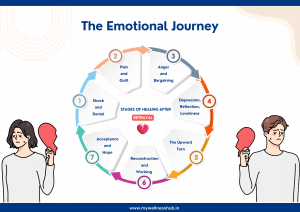Philophobia: Fear of Relationships – What to do?
By Prapoorna M
Last Updated: November 1, 2022
Fears are always specific. One can only make them disappear only by focusing on what exactly causes the fear of relationships. In other words, being aware of your fear helps you devise a plan to overcome it, considering the situation’s specifics. How we react to our fear in our first instinct may only sometimes be correct. It is because when a person fears, they either try to disappear from the relationship, freeze in confusion, or psychologically attack the partner. Fear of relationships can be as normal as any other fear. But these reactions can make us build a relationship, to be a near impossible task. But wanting to be loved and being interested in the person helps keep you from making sudden moves and gives you a chance to overcome your anxieties.
Let us understand why the “fear of relationships” occurs, the reasons for having this fear, the types of fears, and what to do to reduce them.
Why does this happen?
Sometimes, the fear of commitment comes from a bad sentimental history. Suppose the person has had a relationship that has caused him harm and has made him suffer. In that case, he may make an erroneous generalization. He may think all connections will be like this. That is why, unconsciously, he protects himself from love and commitment. These people are often afraid that they are not “in the right relationship” or that the other person will abandon them without warning, be unfaithful or make them suffer.
Considering a real scenario
Let’s take the story of Karan. It is essential for him to feel needed and significant in a relationship, so he deliberately chooses girls who cannot care for themselves and becomes a “psychological mother” to them. At the beginning of the relationship, the girls are captivated by his care. Still, after a couple of months, they begin to glance towards other men.
There is a betrayal that Karan, of course, does not like. He takes good care of the girls and forgives everything. The girls are used to it and they openly tell him about their adventures and are extremely surprised that this is the end of the relationship. At the same time, Karan develops a false belief that all girls cheat. Once is an accident, the second time is strange, and the third time is a statistic. Karan is afraid to lose respect for himself because he understands that the relationship develops according to an unpleasant scenario.

However, the betrayal is because he initially creates relationships where he takes a maternal role instead of a male one. And it is necessary to work first of all with this. Similarly, there can be a different “Love language” for each person, and one must know theirs to find the right person.
Philophobia
Relationship anxiety is found in both women and men. It sounds paradoxical because every person seeks to find a “soul mate” and experience a feeling of love and affection. But the fear of being attached is also seen in people for different reasons. If this fear is more, it turns into a phobia.
Fear of intimacy often develops into Philophobia (derived from the Greek word “love” and “fear”), which is an irresistible and persistent fear of intimate relationships. This fear forces you to destroy any connections with attractive people at the very beginning. This fear doesn’t let you form new relationships, especially those you fear might become emotional. A Philophobe feels most comfortable in the company of a person with whom they are not afraid to fall in love.
Mechanism and Symptoms
The mechanism of development of phobias has yet to be fully understood. Studies find that the imbalance of serotonin, dopamine and gamma-aminobutyric acid (GABA) affects the brain regions responsible for behavioural and emotional responses. They also increase the production of adrenaline and cortisol.
Its symptoms can also be significant in the most severe cases of Philophobia. They can coincide with the consequences of anxiety attacks and include rapid heart rate, nausea, dizziness, excessive sweating, tremors, dry mouth, a feeling of lack of oxygen, mental confusion, impulsiveness, loss of control and panic attacks.
Avoidant attachment disorder
According to Jonathan García-Allen, genetic, environmental, and personality development factors usually interact in Philophobia. It is associated with other disorders of a social nature, such as avoidant attachment disorder. It is an exaggerated need for independence and self-sufficiency. People who suffer from it reject interpersonal relationships. They don’t feel the connections are meaningful and avoid them for fear of being emotionally hurt.
As is logical, the avoidant attachment disorder generates a personality conducive to Philophobia. Any traumatic experience can create difficulties building profound, stable and lasting relationships.
Thoughts and Behaviors
All people with a fear of commitment do not behave similarly. Some withdraw into themselves and do not seek new relationships. Sometimes, they try to hide their problem by falling in love with impossible people or looking for a “perfect” partner. However, it is a self-sabotage mechanism as nobody forces them to maintain a real relationship and put the problem outside themselves.

In other cases, people who fear commitment can be true conquerors as they experience the need to maintain a stable relationship. However, when the relationship begins to take on more serious overtones, they feel confused and take a step back as they feel uncomfortable with their expectations.
Reasons for having the “Fear of Relationships.”
It is crucial to be aware that no one loves in the same way, but the affective style that each one assumes is closely related to how we were loved and cared for during our childhood. That imprint remains throughout our lives, and when an insecure attachment develops, it can lead to commitment phobia.
One of the essential characteristics of the fear of commitment is the inability to maintain a long-term relationship. That doesn’t mean the person doesn’t love their partner, but the feelings they experience at the prospect of commitment can become overwhelming or even frightening, ultimately triggering a flight response.
Fear of getting hurt emotionally!
A painful breakup is familiar to almost everyone. After the end of a relationship, scars and memories of negative experiences remain in the heart, which you don’t want to repeat. Many fears prevent you from falling in love again. They include the fear of not finding the right person, being disappointed, wasting your time, and getting into a relationship where there is no respect for your love.
Fear of not finding the right one
Everybody might have had poor experiences in the past. People have unsuccessful relationships and would make mistakes at a younger age. But in finding a true “soul mate”, our emotions are troubled a lot. These raise emotional issues, leading to the fear of not finding the right one and won’t let us feel committed to anyone quickly.
Today’s youth have opportunities like dating sites filled with abundant profiles, but someone else would suit the requirement. The struggle to find the right one increases. It is an opportunity to look at the situation differently. For example, a girl needs to focus primarily on mutual sympathy and similarity of interests but not on the functionality that a man will bring.
Fear of Rejection
A person’s self-esteem gets affected by their encounters with toxic relationships during childhood. Unhealthy home environments or abusive relationships during childhood affect them the most. Such treatment towards the younger generation can affect their future relationships. The fear of rejection can fill their minds, and they would initially avoid attachment with anyone.
Generally, unmarried men fear that a lady likes only rich men. At the same time, a lady would feel that she is not attractive enough to find a suitable man. Both might also think they wouldn’t find someone who suits their ideologies or likes.

Fear of Losing Oneself
Avoidance of a severe relationship in psychology is called counter-dependence. People with counter-dependence tend to be completely independent. They do not want to take help from anyone even though it is necessary. There can be this fear of losing oneself or depending on someone. Some people have developed a strong sense of independence and autonomy. They unconsciously reject the idea of maintaining a relationship that can create bonds of dependency because, in a certain way, it would be like denying their essence.
Fear of self-disclosure
Psychologists recommend being yourself in a relationship, but it is scary to let your partner get close and open your soul (suddenly, you don’t like it). Therefore, people show the side that will undoubtedly make the right impression. The development of relationships involves the acceptance of other people’s habits and oddities.
Fear of social condemnation
People have different kinds of relationships in society based on their interests. Friendships are also close relationships. But, speaking of romantic relationships or having a partner for life, it again depends on their sexual interests. Nowadays, the sexual orientation of a person is easily identified chiefly by themselves. But, acceptance in society is a big hurdle, which is why most of them choose to be alone.
Fear of Biological issues
Having biological issues like sex-related health issues, disinterest or sexual frigidity, or the inability to bear children can also significantly impact the decision to be alone. The person will not open up about such issues because of the social stigma and can avoid relationships.
To be a person of social nature, one builds relationships with their kind. There is a category of people who voluntarily lead a hermitic lifestyle. Such solitude is not considered a pathology if it is not associated with a fear of entering into a relationship but only with life attitudes and principles. Another thing is the fear of relationships, including with the opposite sex. In this case, a whole life is simply impossible.
Fear of betrayal
Trust is a fragile thing. Difficult to build and easy to collapse. The presence of a negative experience, instead of a substantial rear, makes one think: that it is safe alone. It is essential to carefully look at the person next to you and ask yourself: “Am I ready to take a risk and give a limit of trust? Can I try to be close to this person in peace and comfort?” If the answer is yes and the desire for warmth and intimacy outweighs the fears, give the relationship a chance and re-evaluate the concerns: which ones are real and carried over from past experience. Make sure the shadow of past betrayal does not overshadow a new relationship. Try to start them with a careful construction of security and trust in intuition.
Fear of being addicted to love (fear of use)
Love inspires development: people blossom emotionally in relationships and begin to read more, play sports and learn new topics to be on the same wavelength with a partner. But what if your partner starts asking for a favour, and then another, and suddenly you realize you are being taken advantage of? You are already picking up someone else’s child from school. Still, you are paying for the furniture in the apartment of your loved one because he needs a sofa to relax after work. Once burned on something like this, people are afraid that they will allow themselves to be used because of a feeling of love.

Fear of responsibilities and financial burdens
Relationships bring responsibilities and commitments. Marriage, family, kids, future, and financial troubles are a bundle of fates a person has to face if stepped into this circle. Taking up the responsibilities of your partner (whether earns or not) is generally the duty of a husband as per societal norms. Apart from that, bearing kids is also a big responsibility you must be ready for. Especially for a girl, it is time they should take extra care. Once the kids arrive, everything changes. We should be ready for that. And everyone has their own financial goals and thoughts about their future life. A person should be prepared to welcome all these changes in life if they are about to make a permanent commitment. This can also be a hindrance to being up for obligations in life.
What to do?
Let us see what can be done to overcome such fears, which would lead to the fear of commitment.
Take responsibility
The fear is justified and is solved by defining clear boundaries, what you are ready to help with and what resources to share. It is one thing when you are prepared to invest your time and energy and quite another when you are ready to invest money. For example, to the request “pay me a taxi to get to the place of our first date”, you will definitely answer “no”, but if this relationship has become serious, then you are ready to pay for a taxi, and even pick up the girl yourself.
Welcome them
The most important task of fighting fears is to stop perceiving relationships as a source of danger and remember that this is a source of happiness and inspiration. You will succeed if you allow yourself to boldly look fear in the eye and focus on overcoming it. It would help if you did not meet this fear in a relationship alone. A partner will help dispel feelings, even with their presence and a reminder of why you are doing all this.
Throw your past away
It is expected that almost without realizing it, your emotional memory takes you back to those first days after the breakup, in which you felt so bad. You remember how hard it was for you to get over it, and they start to wake up a whole series of fears associated with those past sensations. But a new relationship is only possible if you can get over the past. You may take the help of your friends, observe happy couples, and read good books. Seeking professional support will also be helpful if you’re unable to cope on your own.
Open up
If you are still fearing that your new relationship could be tough to deal with, open yourself up. It will not be possible to show only the bright side because while you are hiding, the partner also does not show weakness. Building mutual trust takes time and effort, and the fear of self-disclosure passes with the interaction experience as you and your partner open up.

Communication is fundamental in any relationship. Therefore, the goal is not only for the person to be able to express their fears and feelings to others but, above all, to be able to do so to his partner. Experts say, “Make your partner aware of your fears, which will help a great understanding of your reactions. It will reduce the emotional tension.”
You can reduce the fears on your own by reading relevant literature, doing yoga, meditation, or affirmations. Good results are obtained by expanding the circle of communication, making new friends, meeting and traveling together. If you think it helps, it is always good to seek professional help from a counselling psychologist.
Book your Free Consultation Today
Parent/Caregiver Info:
Client’s Details:
* Error Message









